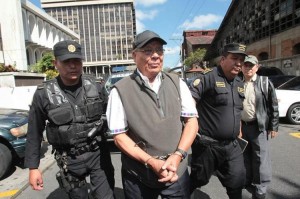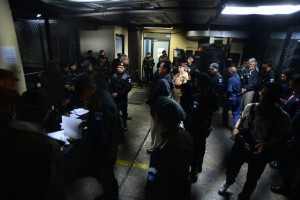 Guatemalan authorities have arrested at least 18 high-ranking Guatemalan military officers yesterday on charges of crimes against humanity and forced disappearance, according to local press reports.
Guatemalan authorities have arrested at least 18 high-ranking Guatemalan military officers yesterday on charges of crimes against humanity and forced disappearance, according to local press reports.
The arrests include retired generals Benedicto Lucas Garcia, head of the military under his now-deceased brother and former dictator Romeo Lucas Garcia, and Manuel Antonio Callejas y Callejas, long known for his high-level positions during the dirty war and his concurrent management of organized crime networks.
The crimes with which they are charged were part of operations conducted from a military base in the department of Coban between 1981 and 1988, including acts that formed part of the Maya Achi genocide. Exhumations at the base in 2012 recovered remains from over 550 victims–a fraction of the tens of thousands of killings the military is believed to have conducted in Alta and Baja Verapaz from that base but an important step in gathering evidence.
Arrests are ongoing. In a press conference Jan. 6, prosecutors declined to provide specific information regarding pending warrants. Journalists suggested that as many as 25 warrants exist. Initial hearings are expected to begin this Friday. There is no possibility of release pending trial on these charges.
These prosecutions are the result of over 20 years of efforts by the victims, coupled with hard-fought gains in cleaning up corruption in the justice system promoted by human rights and judicial reform activists. ADIVIMA, the association of Maya Achi genocide victims, is a co-complainant in the prosecution, along with the national victims associations, the Association of Relatives of the Detained/Disappeeared in Guatemala (FAMDEGUA) and the Mutual Support Group (GAM).
Unearthing Crimes of the Past and Present
The retired general who was in charge of the Coban base during much of the violence, Ricardo Mendez Ruiz, would undoubtedly have been among those arrested today had he not died on January 1, 2016. Mendez Ruiz maintained a high profile in Guatemala over the past several years due to the activities of his son of the same name. The younger Ricardo Mendez Ruiz is director of the Foundation Against Terrorism, which has promoted malicious legal complaints against those pursuing justice for the crimes committed during Guatemala’s dirty war–a form of political persecution backed by influential retired military officers.
Mendez Ruiz formally accused Orlando Lopez, the Special Prosecutor for Human Rights who led the investigation behind today’s arrests, with “illicit association” for his role in the ongoing prosecution of former dictator Efrain Rios Montt for the Ixil Maya genocide.
Similarly, Mendez has accused Fredy Peccerelli, the director of the internationally renowned Forensic Anthropology Foundation of Guatemala which carried out the 2012 exhumations, of patently ridiculous crimes such as impersonating a judge, claiming Peccerelli acted like a judge when he provided expert testimony at the Rios Montt trial. That these and similar prosecutions have not been closed is a reminder that the justice system in Guatemala has significant challenges still to overcome.

Concern for the safety of those pursuing justice in Guatemala is heightened as the incoming president, Jimmy Morales, a founder of the National Convergence Front (FCN) party, is set to take office on January 14. Guatemala’s last elected president, Otto Perez Molina, was forced to resign in September 2015 to face corruption charges, and his party, the Partido Patriota (PP), partially collapsed in the scandal. Analysts described the FCN as the Plan B for the political networks that formerly backed the PP. The FCN and PP are both dominated by retired military officers.
The newly elected congress convened its first session yesterday. On the first day of the lawmakers four-year term, Congress was asked by prosecutors to impeach the newly elect FCN congressman and former military officer, Edgar Justino Ovalle Maldonado, so he can face charges of crimes against humanity and forced disappearance.
Concerns over the safety of justice advocates have heightened since the arrests. The former military men arrested today have close ties to Guatemala’s organized crime networks. Criminal groups in complicity with politicians operate regionally in Central America’s “Northern Triangle” of Guatemala, Honduras and El Salvador, and are largely responsible for some of the highest murder rates in the world.
Their influence within the region’s justice systems has guaranteed high levels of impunity for their crimes. In 2008, the United Nations backed International Commission Against Impunity in Guatemala (CICIG, by its Spanish initials) began operations to combat organized crime’s infiltration of the justice system, which has allowed men like former General Manuel Antonio Callejas y Callejas to operate massive organized crime networks with impunity.
In June of 2010 a lawyer notorious for his connections to organized crime was named as Attorney General, but was forced out within two weeks when CICIG’s first director, Spanish prosecutor Carlos Castresana, resigned in protest. This process opened the path to the appointment of the celebrated reformer, former Attorney General Claudia Paz y Paz. Under Paz y Paz, prosecutions of crimes against humanity were allowed to proceed, provoking the ire of retired military personnel like Ricardo Mendez. The Perez Molina administration refused to renew her term in early 2015.
Guatemalan and international experts have long warned of the composition of these criminal networks. In 2004 the United States revoked Callejas y Callejas’ visa on suspicion of involvement in drug trafficking. Callejas y Callejas was considered a key actor in a cabal of high-ranking military officers who were the shadow power behind the nominally elected officials after the nation’s fictitious transition to a civilian democracy.
Other members of this cabal included Otto Perez Molina, the outgoing president now jailed as he faces corruption charges, and the deceased former Colonel Fernandez Ligorria whose son, Luis José Fernandez Chenal, was the second-ranking PP congressman in the outgoing congress. Fernandez Ligorria died in 2011 but served out of the Coban base and would surely have been implicated in this investigation.
In 1996, Fernandez Ligorria was signaled by investigative reporters as having placed a bomb that January in a car parked in a Washington, DC neighborhood that belonged to a lawyer assisting Jennifer Harbury, the U.S. citizen who was married to the Guatemalan guerrilla commander, Efrain Bamaca. At the time, Harbury was uncovering evidence that Perez Molina oversaw her husband’s illegal clandestine detention, prolonged torture and presumed extrajudicial execution, and that the CIA paid for information obtained from his torture.
The bomber was never prosecuted. Fernandez Ligorria was attending the Inter American Defense College at the time, even though in 1995 reports involved him in drug trafficking and car theft rings, along with Callejas y Callejas. Years later he was accused by Guatemalan journalists of being a commander of the Zetas.
One of those arrested, Byron Barrientos, served four years in prison from 2004 to 2008, convicted in the robbery of Q81 million–over $10 million dollars–from the government while serving as Minister of the Interior in 2000 and 2001.
Arrests reported yesterday include:
- Ismael Segura Abularach,
- Pablo Roberto Saucedo Mérida
- César Augusto Ruiz Morales
- Juan Ovalle Salazar
- Manuel Antonio Callejas Callejas
- Gustavo Alonzo Rosales García
- Hugo Ramiro Zaldaña Rojas
- Francisco Luis Gordillo Martínez
- Raúl Dahesa Oliva
- Carlos Humberto Rodríguez López
- Edilberto Letona Linares
- Edgar Rolando Hernández Méndez
- José Antonio Vásquez García
- Byron Humberto Barrientos Díaz
- Manuel Benedicto Lucas García
- Carlos Augusto Garavito Morán
- Luis Alberto Paredes Najera
- César Augusto Cabrera Mejía
Annie Bird is Director of Rights and Ecology [annie@rightsandecology.net / twitter: @rights_ecol / Rights and Ecology listserv] and a frequent contributor to the CIP Americas Program www.americas.org



